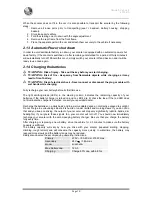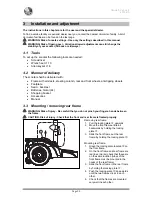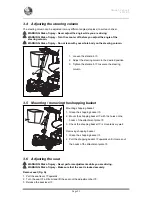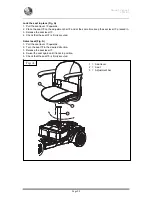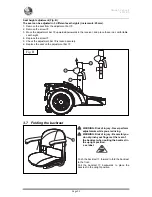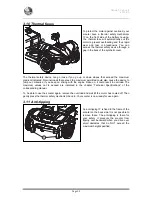
Venus 3, Venus 4
2014-03
Page 10
Mobile medium-range transmitting and receiving devices (e.g. car antennas, with the antenna
mounted on the outside of the vehicle)
-
Fixed transmitting and receiving sets
-
Fixed mobile transmitting and receiving devices
-
Fixed radio, TV and navigation systems
Long-range transmitting and receiving devices
-
Radio and television towers
-
Amateur radio sets
Other home devices like CD player, notebook, cordless phones, AM/FM radios, electric shavers and
hair dryers, so far as we know, will have no influence provided that they function perfectly and their
cabling be in an excellent condition. Please conform to the operating instructions accompanying such
electric instruments to ensure trouble free operating of your scooter.
1. Do not operate hand-held (transceivers-receivers), such as citizens band (CB) radios, or turn ON
personal communication devices, such as cellular phones, while the powered vehicle is turned ON;
2. Be aware of nearby transmitters, such as radio or TV stations, and try to avoid coming close to
them;
3. If unintended movement or brake release occurs, turn the powered vehicle OFF as soon as it is
safe;
4. Be aware that adding accessories or components, or modifying the powered vehicle, may make it
more susceptible to EMI (Note: There is no easy way to evaluated their effect on the overall
immunity of the powered vehicle);
The intensity of the interfering EM energy can be measured in volts per meter (V/m). Each powered
vehicle can resist EMI up to a certain intensity. This is called its “immunity level”. The higher the
immunity level, the greater the protection. At this time, current technology is capable of achieving at
least a 20 V/m immunity level, which would provide useful protection from the more common sources
of radiated EMI. This powered vehicle model as shipped, with no further modification, has an
immunity level of 20 V/m without any accessories.
2.2 Carrying the scooter
Turn the scooter "OFF" before carrying.
The weight of the scooter is for Venus 3: 34,8 kg (with batteries) or 24,4 kg (without batteries) and
Venus 4: 38,1 kg (with batteries) or 28,7 kg (without batteries). Carry the scooter with 2 or 3 persons
to the desired place. Take the frame on the chassis, and not by the bumpers or the plastic parts. Only
on the fixed parts from the frame. On the rear frame is a handgrip that can be usefull to carry the
scooter to the desired place.
The best way to carry the scooter is to make use of neutral mode of the scooter. Place the scooter in
neutral and roll the scooter to the desired place.
If this is not possible you can carry the scooter by following steps:
1. Switch the scooter off.
2. Remove loose parts (seat, battery housing, shopping basket).
3. Store loose parts in a safe place.
4. Fold the steering column down.
5. Remove the rear frame from the front frame. On the rear frame is a handgrip to carry the rear
frame to the desired place.
6. Lift the seperate parts to the desired place.
2.3 Assembly and disassembly of the scooter
L
WARNING:
Risk of injury - Make sure that all parts are assembled properly.
L
WARNING:
Risk of injury - Assembly and disassembly must be done by trained
personnel (e.g. specialist dealer).
L
WARNING:
Risk of injury - Be careful not to cut or bruise yourself with the cables.
L
WARNING:
Risk of injury - Turn the scooter off before disassembly / assembly.




















